Jailed Kurdish leader to call truce after 30 years


Abdullah Ocalan, head of the Kurdistan Workers’ Party (PKK) is said to be in talks with the Ankara government from his prison cell on an island near Istanbul.
On Wednesday, the PKK freed a group of Turkish soldiers held prisoner in its mountain stronghold in northern Iraq, a move seen as an olive branch to assist negotiations.
Advertisement
Hide AdAdvertisement
Hide AdPrevious contact with Ocalan, once described as a “baby killer” by Turkish media, was a closely-guarded secret, but the latest talks have been openly acknowledged by Ankara, risking a conservative backlash.
There are perils for all and forces on both sides that stand opposed to talks. In the regional centre Diyarbakir, a city of anonymous blocks of flats ringed by centuries-old ramparts, the conflict eats into the heart of families and friendships. One man spoke of how his oldest son had joined the insurgency back in the 1980s and now fights for the PKK, while his youngest now intends to join the Turkish army. He fears, if the conflict continues, the two brothers might come face-to-face in the mountains as enemy combatants.
The three-decade Kurdish conflict has opened Turkey to accusations of human rights abuses and consigned the south-east to poverty. It has also forced a nation eager for a greater role on the world stage to face up to its own ethnic diversity.
In this city of 1.5 million people, where boys selling tea and turnip juice dart among old men in traditional Kurdish baggy trousers, there is widespread resentment of a state which for decades denied Kurdish ethnic identity.
But whether driven by his presidential ambition ahead of elections next year, a path which would be smoothed by Kurdish support, or by fear of Kurdish assertiveness in neighbouring northern Iraq and war-torn Syria – also part of what was Kurdistan, which includes part of Iran – prime minister Recep Tayyip Erdogan has a new sense of urgency.
Since October, intelligence officers and Kurdish politicians have been speaking to Ocalan in the island prison where he was dispatched in 1999 after being captured by Turkish special forces in Kenya. What has emerged appears the most comprehensive effort yet to end the conflict with the PKK, considered a terrorist group by America and the European.
“There have been many attempts at peace, but this is the most serious,” said Imam Tascier, head of the Revolutionary Democratic Cultural Associations, one of several Kurdish leftist groups formed in the 1970s and a precursor to the PKK.
“Why? Because it is being carried out in the open. Previous efforts have disappeared without trace,” he said. “But a ceasefire alone will not solve the problem, this is only the beginning.”
Advertisement
Hide AdAdvertisement
Hide AdThe PKK originally demanded creation of an independent Kurdish state in the south-east but has now moderated its declared goal to autonomy within Turkey.
Mr Erdogan has taken steps his predecessors would never have dared, including allowing Kurdish television broadcasts and elective Kurdish language courses at state schools.
Leaks from the talks with Ocalan reveal a roadmap envisaging a PKK ceasefire from 21 March, the Kurdish New Year, the withdrawal of fighters to northern Iraq and eventual disarmament in return for greater rights for Kurds.
“It is a process,” said Aydin Altac, local head of Erdogan’s AK Party. “When you look back to before 2002, you could not even say you were Kurdish, you could face prison. We are now talking about autonomy. Can you imagine the distance we have come?”